#this feels so meta
Text

Update from the Smosh Reddit stories with Ian and Anthony: My Boss is secretly filming me..
24 notes
·
View notes
Text
The scene in the Barbie trailer when Barbie is skating around with Ken and asks "Why is everyone staring at me?"
THAT'S EXACTLY WHAT IT FEELS LIKE TO BE AN ADOLESCENT GIRL.
Living in Barbieland (childhood girlhood) but then suddenly you're all grown up in the real world subject to scrutiny and sexualisation (the guy slapping Barbie's ass) and feeling like existing is a crime?
Being forced by adult men into a box (which leads to the not like other girls syndrome) and exploring the 'real world' (being forced to grow up too quickly) while fighting the realisation that maybe the world sucks and being a woman is so difficult while hoping with all your heart that it's not always going to be this way.
Losing touch with the very things that made you happy because they're considered immature and girly? (The group of teens that said they hadn't played with Barbies since they were five.)
Older women telling you that you have to learn the truth about the world and that you can never have your old life back (Kate Mckinnon's Barbie) despite it being the only thing you yearn for, but also older women being a bright spot and support (the old woman on the bench) in the endless slough of life.
And this is just the trailer!!! I'm so excited for this movie I can't breathe, Greta Gerwig the woman that you are 😭
#barbie#more thoughts on this when my mental coherence returns#but ahhh!#im also really excited to see america ferrera's role because I have a feeling it's gonna be pivotal#Barbie meta#the barbie movie#barbie (2023)#shut up im so excited#ken is the emotional support pet every adolescent girl needs#THIS IS EXACTLY WHAT IT'S LIKE TO BE A TEENAGE GIRL#i already love this movie so much#and it hasnt even released#thoughts r scattered cuz the trailer is that good
17K notes
·
View notes
Text
there is something unique and deeply special about monkey d luffy as a protagonist. he’s overwhelmingly ADORED by the fandom. he’s consistently the most or at least top 3 most popular characters in the whole series. peoples takes about him are gushingly positive. and that’s… really uncommon.
a LOT of fandoms i’ve witnessed or been in have a tendency to favor characters other than the main character. especially in anime. the main characters are often written as a blank slate for readers/watchers to project onto, but that makes them not as interesting and so they don’t get the fan attention.
but luffy is so far from that. and he’s ALWAYS been this way. we love him so much. he’s the heart of the story and the heart of the fandom in every single way. and i think that speaks to how well-written he is as a character. he’s fun and charming and complex and interesting and he makes us laugh and cry and cheer and hope and love. he’s able to inspire so much joy in people, both in his world but also in this one. and i think that’s really special. i feel so grateful to have found this story that means so much to me, and i’m so grateful that luffy exists.
#i’m in a very emotional mood tonight and i was just. musing#about how wonderful our best boy is#and how much true and genuine joy and hope and wisdom he has given me#i feel like i’ve learned so much from him about how to love people#and that’s. freely. enthusiastically. easily and without abandon.#love you monkey d. luffy. you saved my life#one piece#monkey d luffy#one piece meta#personal
7K notes
·
View notes
Text
I am BARELY resisting going full red-strings-corkboard on this season. And by barely resisting I mean not resisting at all here is an extremely long list of the events those pins would be marking out.
BigB getting a Task that was a different color than everyone else's. It's not just a randomly assigned Hard Task, bc Scar rerolled for a Hard Task and his was also just a white envelope. It's fundamentally different.
That task taking BigB away from socialization, and seemingly being an incredibly time-consuming and dull request. Of profound disinterest to any watchers.
The phrasing of his Task!!
Dig a big hole. All the way down. At least 3x3. Make it your base if you want.
Everyone else's are direct and formal - the only one with more than one sentence was Skizz's, with the rule clarification of "One attempt only." Bigb's Task is four short abrupt sentences. It is also the only Task to contain extraneous information, 'Make it your base if you want.' The requirements (at least 3x3) feel like an afterthought to mimic the numerical/specific demands of the other tasks.
Evo symbol on the face of the Secret Keeper statue.
The fact that there's a statue at all; the fact that there is a physical representation of what is assigning tasks that everyone must complete, when previously everything was always handled via commands and unseen RNG.
Grian talking to the statue, and (bc of his Actual Role as game organizer) acting as a mediator for the impartial decisions handed down, speaking for it.
Grian making one last bad joke and saying he doesn't know if it counted or not- depends on whether we the audience laughed.
Grian asking for task recommendations from the audience. The watchers are making the tasks. The Watchers are making the tasks.
Again I could be off-base, and I'm not usually even that smitten with bringing in Evo lore. I don't want a Big Bad really...but. It feels like something very unusual and intentional and cool is happening in this series. And I'd guess we'll know if theres something going on once we have more than one data point.
My largely unfounded suspicion is that there is another being (maybe Listeners, maybe something else) trying to reach out to the Players via decoy Tasks, and BigB was the first recipient. Get them alone, make them of disinterest to the watchers, and tell them something we don't get to know.
Because that's the really, really fucking cool part (if my wacky theory is remotely right): We're the bad guys. We're the ones giving out tasks - hell, we're the ones actively brainstorming harder and crueller tasks in Grian's comments!
If they actually made a story where the Players have to keep secrets from us I will be delighted. Bc that is the same genius bullshit that made Evo Watcher lore so fun
#secret life#slsmp#life series#grian#secret life smp#bigb#i think im starting to get the shape of the conceit#this could all be nonsense of course. i may be completely off base and nothing will happen and it's just a normal life series#but it feels like there's something Larger happening here#anyways. will keep thinking and mulling this over and collecting scraps of evidence#secret life spoilers#slsmp spoilers#spoilers#salem meta#salem tag#im so enriched. i love being wrong about stories
6K notes
·
View notes
Text
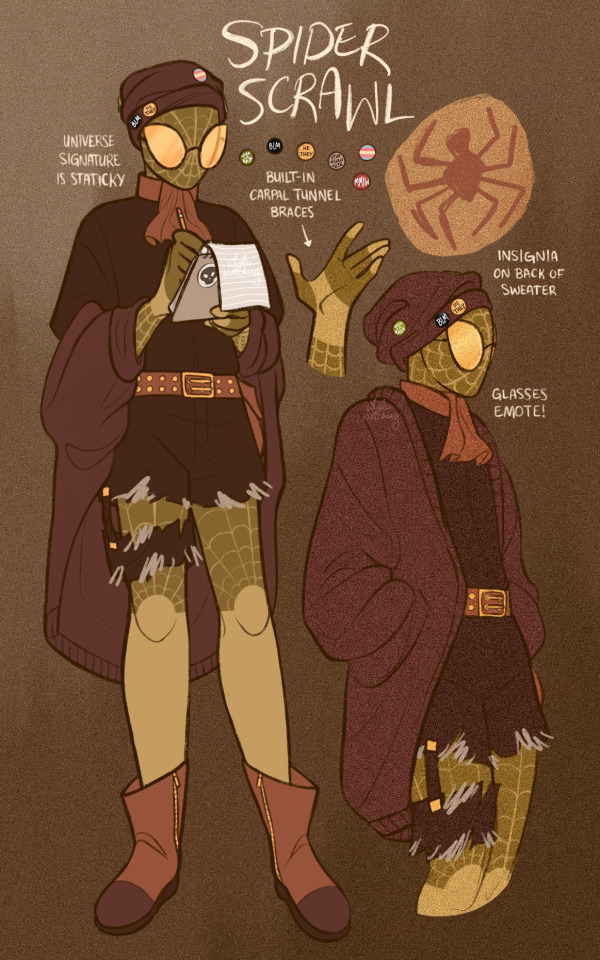

diagnoses u with fanfic tags
yeah i caved. welcome spideysona
their universe is 1990s san francisco. by day they work as a struggling writer for the bugle, sort of following in the footsteps of (movie-adjacent) eddie brock; by night they’re spider-scrawl, fighting systemic injustice, writers’ block, and the occasional mad scientist invention. his world is less rife with supernatural evils than most, but he’s also fucking with the government and corporations and all, so it balances out
their unique thing is that they have, like, shitty meta clairvoyance in the form of inherently understanding tropes, clichés, story structure, etc. like if cinemasins/wins were a superhero. they were approached to join the society because miguel thought they’d be chill or even helpful with canon events—unfortunately scribble here is not whatsoever into following rigid plot structure for the sake of unnecessary thematic suffering, saw the plot twist a miles away, and peaced. but not before snagging a day pass so they could watch atsv in person
they never take off their mask, and no one knows their name—he says it’s because he doesn’t want to lose his identity in a sea of spider-people, leading most to theorize that san-fran-spidey is some flavor of peter parker, but who’s to say for sure? the doylist reason, which he is in fact aware of, is that i don’t know either lol
#spider man: across the spiderverse#spidersona#spider scrawl#spider punk#spider noir#hobie brown#noirpunk#just a tad ;)#brass tacks means facts!#haha do you get it miles like a mile away but miles was the one wh—#so anyway sona shit#eddie in their universe has left the bugle for better things (read: got fired movie style)#still a bangin journalist tho and scrawl aspires to be like him#their deadpool is just as meta as them. they’re buddies#usually i’m not one for sonas but this was fun#static and colors inspired by that can u ever forgive me movie from 2018#scrawl puts on the mask to feel more confident about fighting the system#hopin & prayin it’ll do the same for me :’)
5K notes
·
View notes
Text
So I accidentally almost got into an argument on Twitter, and now I'm thinking about bad historical costuming tropes. Specifically, Action Hero Leather Pants.
See, I was light-heartedly pointing out the inaccuracies of the costumes in Black Sails, and someone came out of the woodwork to defend the show. The misunderstanding was that they thought I was dismissing the show just for its costumes, which I wasn't - I was simply pointing out that it can't entirely care about material history (meaning specifically physical objects/culture) if it treats its clothes like that.
But this person was slightly offended on behalf of their show - especially, quote, "And from a fan of OFMD, no less!" Which got me thinking - it's true! I can abide a lot more historical costuming inaccuracy from Our Flag than I can Black Sails or Vikings. And I don't think it's just because one has my blorbos in it. But really, when it comes down to it...
What is the difference between this and this?
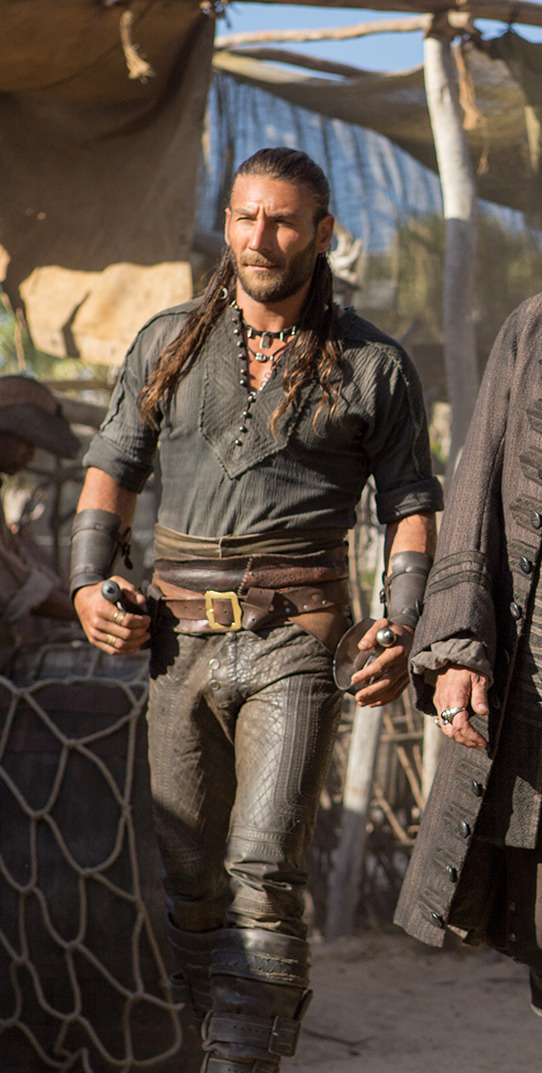
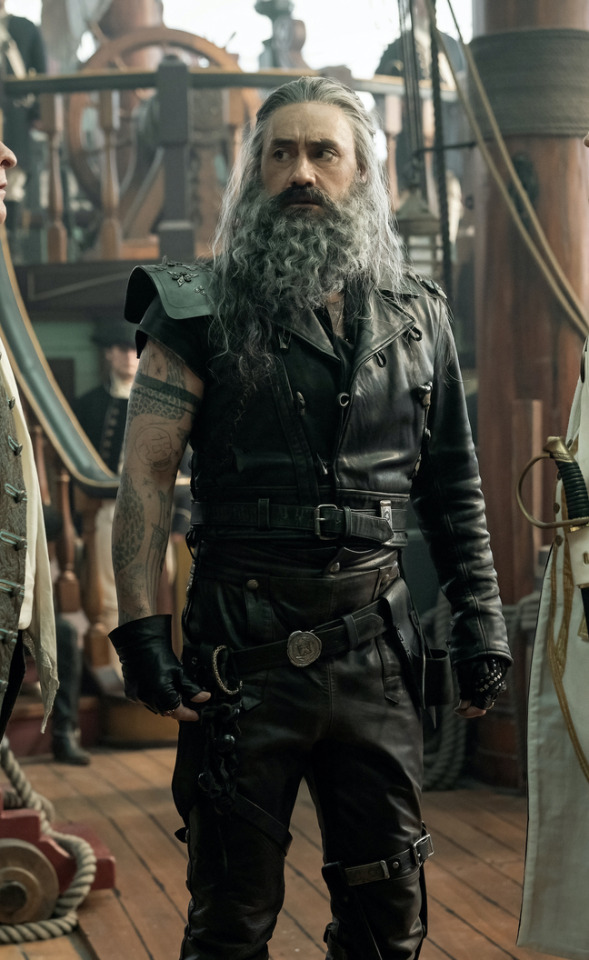
Here's the thing. Leather pants in period dramas isn't new. You've got your Vikings, Tudors, Outlander, Pirates of the Caribbean, Once Upon a Time, Will, The Musketeers, even Shakespeare in Love - they love to shove people in leather and call it a day. But where does this come from?
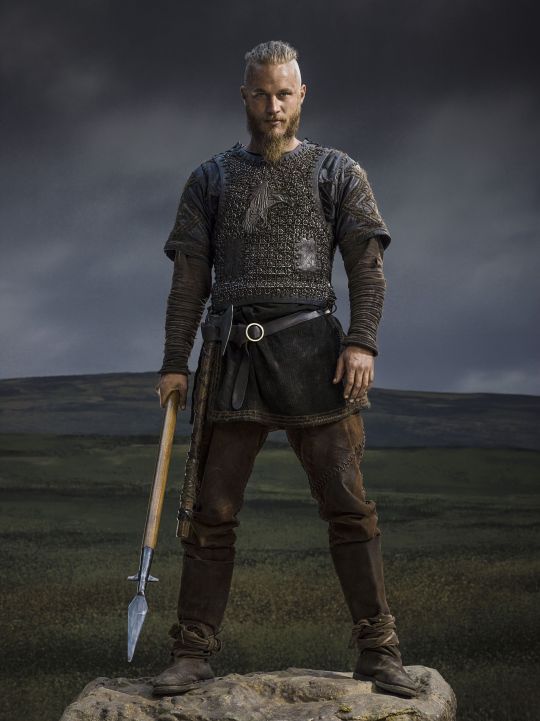
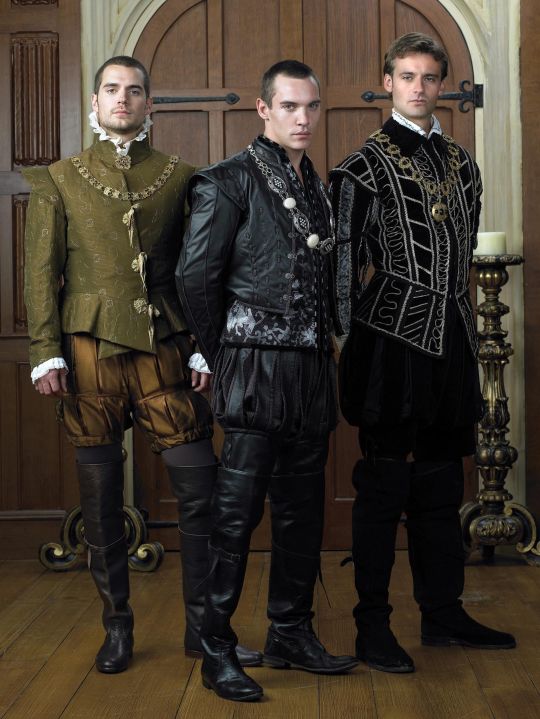
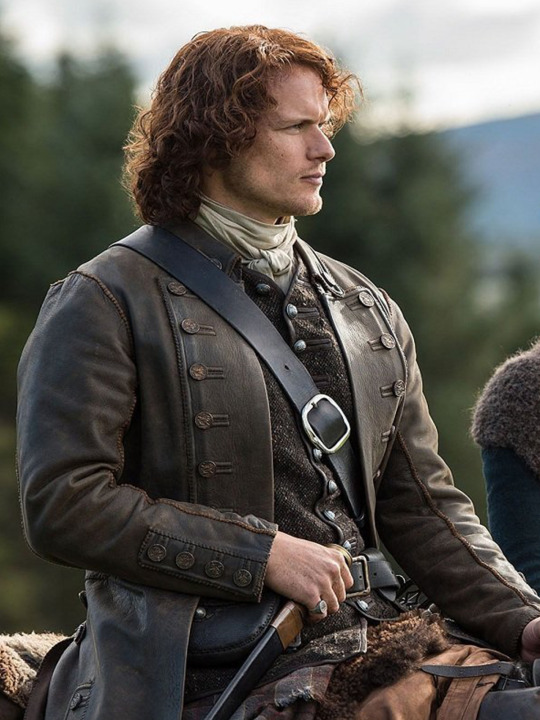

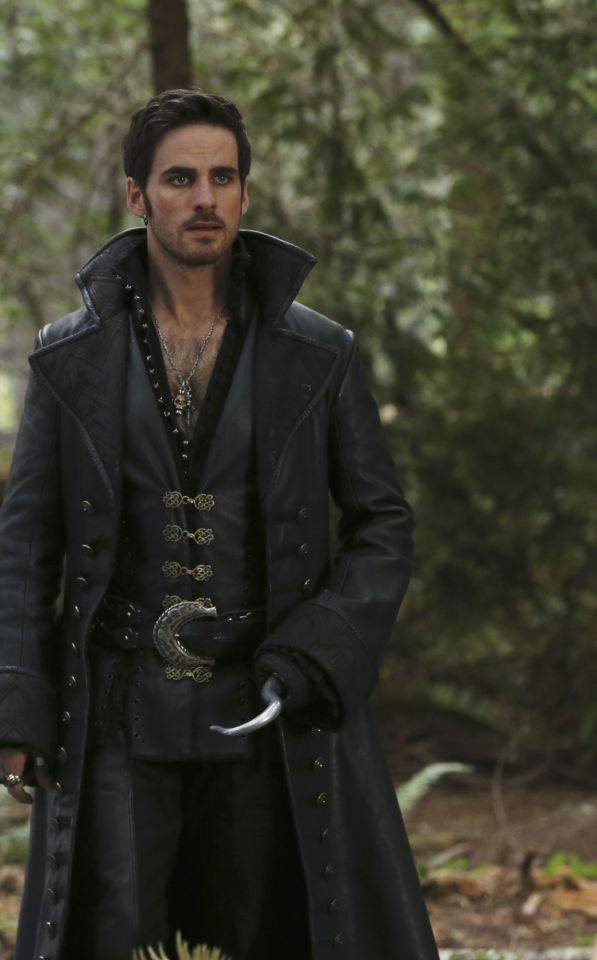
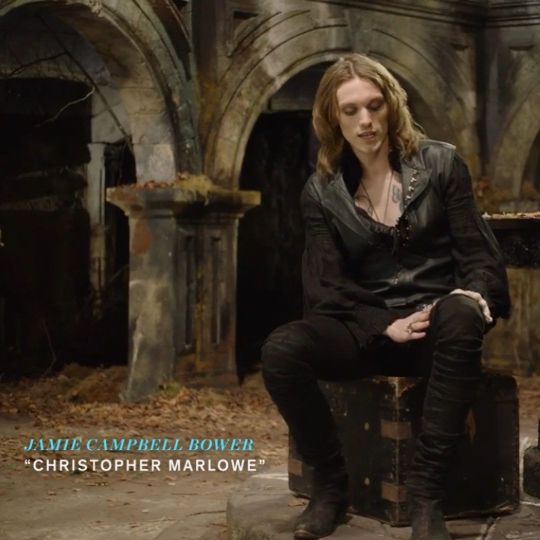
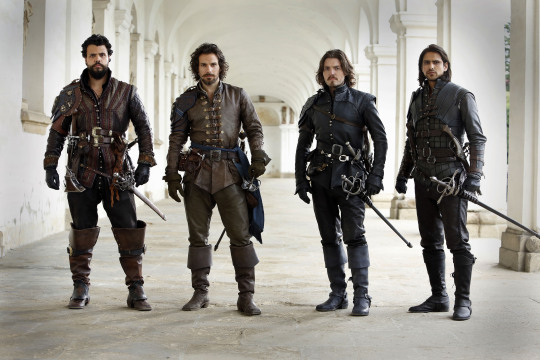
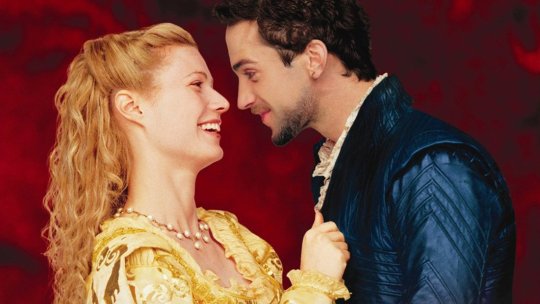
Obviously we have the modern connotations. Modern leather clothes developed in a few subcultures: cowboys drew on Native American clothing. (Allegedly. This is a little beyond my purview, I haven't seen any solid evidence, and it sounds like the kind of fact that people repeat a lot but is based on an assumption. I wouldn't know, though.) Leather was used in some WWI and II uniforms.
But the big boom came in the mid-C20th in motorcycle, punk/goth, and gay subcultures, all intertwined with each other and the above. Motorcyclists wear leather as practical protective gear, and it gets picked up by rock and punk artists as a symbol of counterculture, and transferred to movie designs. It gets wrapped up in gay and kink communities, with even more countercultural and taboo meanings. By the late C20th, leather has entered mainstream fashion, but it still carries those references to goths, punks, BDSM, and motorbike gangs, to James Dean, Marlon Brando, and Mick Jagger. This is whence we get our Spikes and Dave Listers in 1980s/90s media, bad boys and working-class punks.
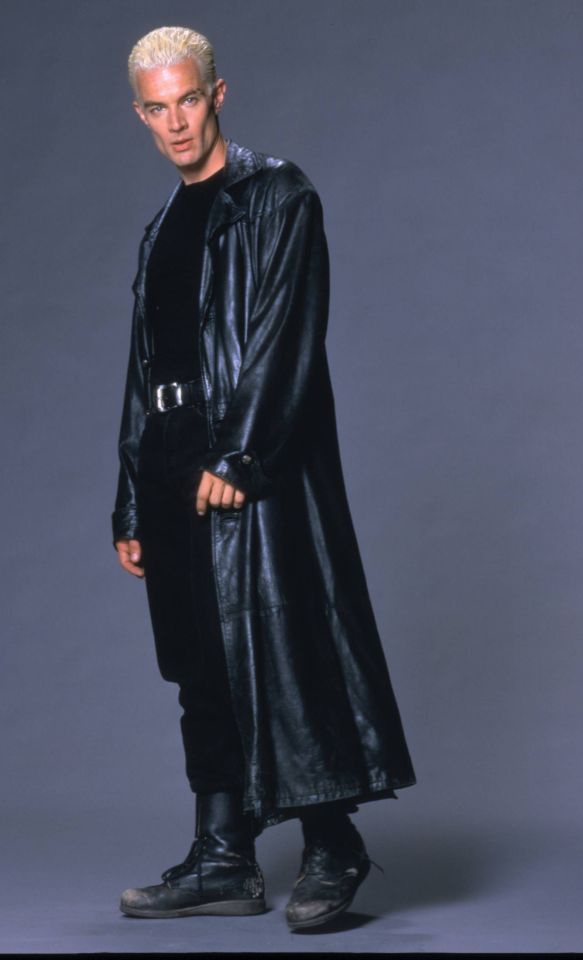
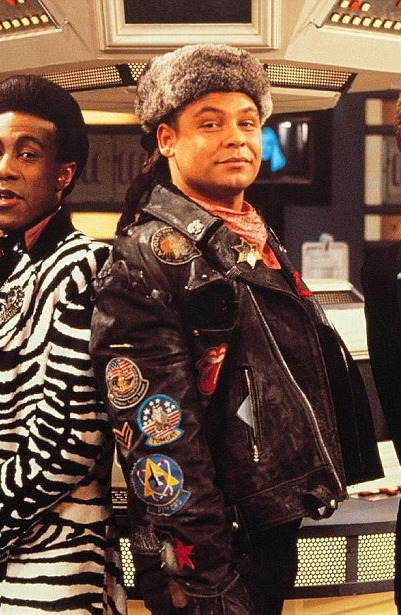
And some of the above "historical" design choices clearly build on these meanings. William Shakespeare is dressed in a black leather doublet to evoke the swaggering bad boy artist heartthrob, probably down on his luck. So is Kit Marlowe.
But the associations get a little fuzzier after that. Hook, with his eyeliner and jewellery, sure. King Henry, yeah, I see it. It's hideously ahistorical, but sure. But what about Jamie and Will and Ragnar, in their browns and shabby, battle-ready chic? Well, here we get the other strain of Bad Period Drama Leather.
See, designers like to point to history, but it's just not true. Leather armour, especially in the western/European world, is very, very rare, and not just because it decays faster than metal. (Yes, even in ancient Greece/Rome, despite many articles claiming that as the start of the leather armour trend!) It simply wasn't used a lot, because it's frankly useless at defending the body compared to metal. Leather was used as a backing for some splint armour pieces, and for belts, sheathes, and buckles, but it simply wasn't worn like the costumes above. It's heavy, uncomfortable, and hard to repair - it's simply not practical for a garment when you have perfectly comfortable, insulating, and widely available linen, wool, and cotton!
As far as I can see, the real influence on leather in period dramas is fantasy. Fantasy media has proliferated the idea of leather armour as the lightweight choice for rangers, elves, and rogues, a natural, quiet, flexible material, less flashy or restrictive than metal. And it is cheaper for a costume department to make, and easier for an actor to wear on set. It's in Dungeons and Dragons and Lord of the Rings, King Arthur, Runescape, and World of Warcraft.
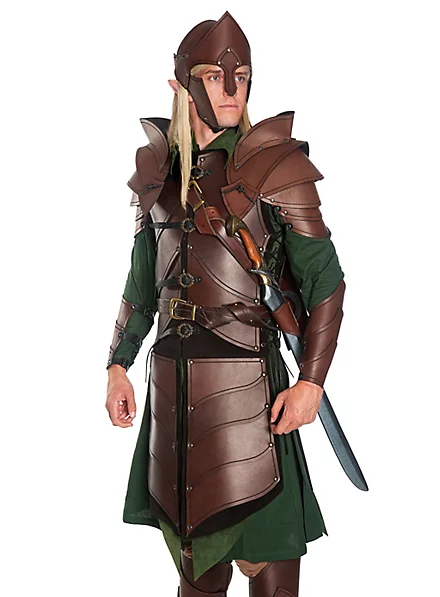
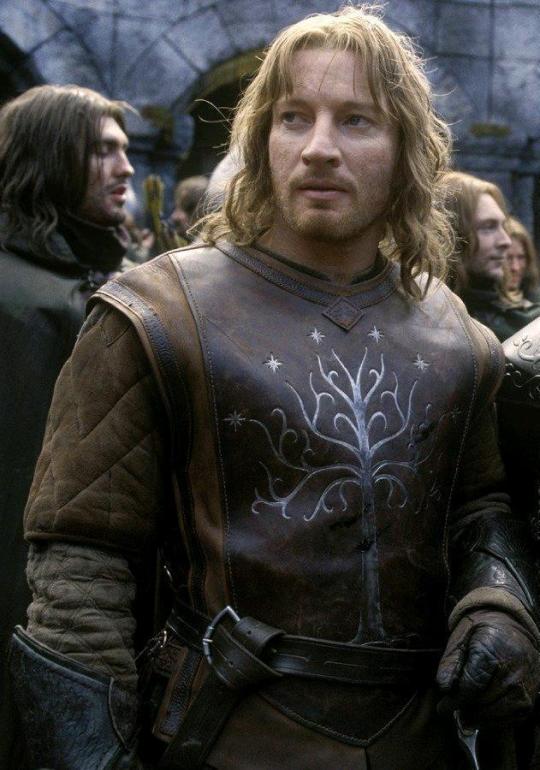
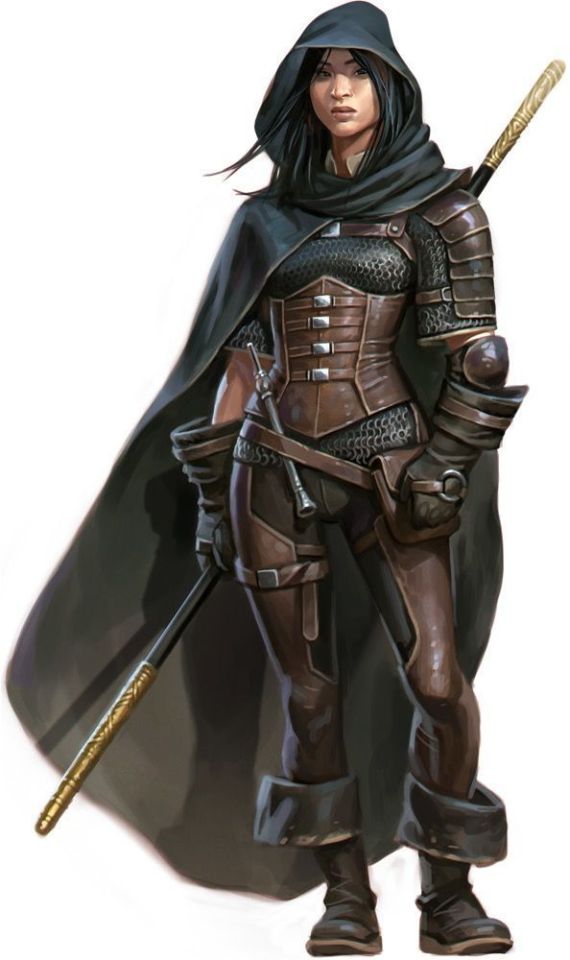
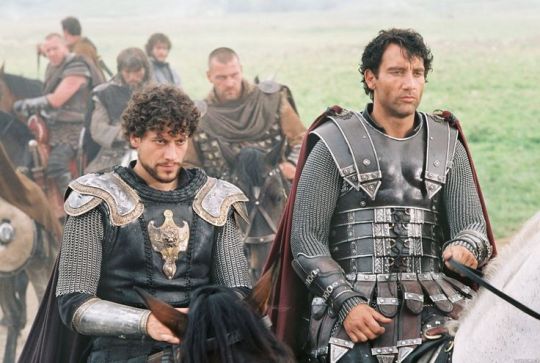

And I think this is how we get to characters like Ragnar and Vane. This idea of leather as practical gear and light armour, it's fantasy, but it has this lineage, behind which sits cowboy chaps and bomber/flight jackets. It's usually brown compared to the punk bad boy's black, less shiny, and more often piecemeal or decorated. In fact, there's a great distinction between the two Period Leather Modes within the same piece of media: Robin Hood (2006)! Compare the brooding, fascist-coded villain Guy of Gisborne with the shabby, bow-wielding, forest-dwelling Robin:
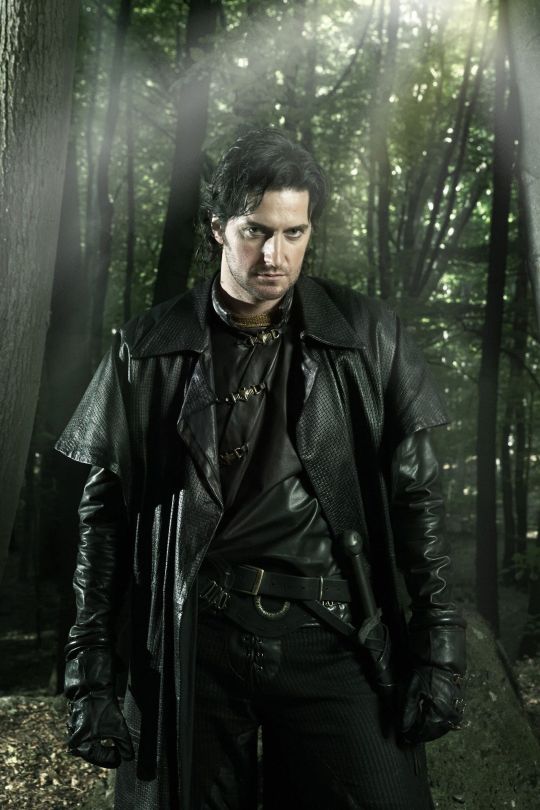
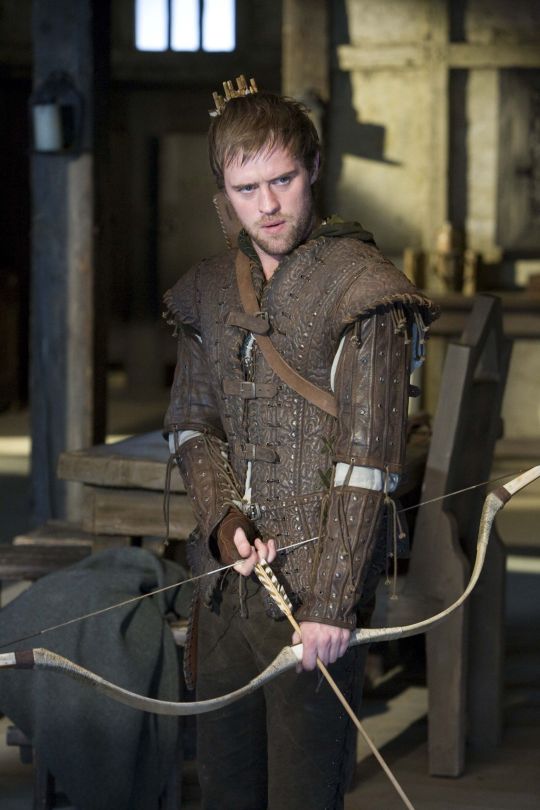
So, back to the original question: What's the difference between Charles Vane in Black Sails, and Edward Teach in Our Flag Means Death?
Simply put, it's intention. There is nothing intentional about Vane's leather in Black Sails. It's not the only leather in the show, and it only says what all shabby period leather says, relying on the same tropes as fantasy armour: he's a bad boy and a fighter in workaday leather, poor, flexible, and practical. None of these connotations are based in reality or history, and they've been done countless times before. It's boring design, neither historically accurate nor particularly creative, but much the same as all the other shabby chic fighters on our screens. He has a broad lineage in Lord of the Rings and Pirates of the Caribbean and such, but that's it.
In Our Flag, however, the lineage is much, much more intentional. Ed is a direct homage to Mad Max, the costuming in which is both practical (Max is an ex-cop and road warrior), and draws on punk and kink designs to evoke a counterculture gone mad to the point of social breakdown, exploiting the thrill of the taboo to frighten and titillate the audience.
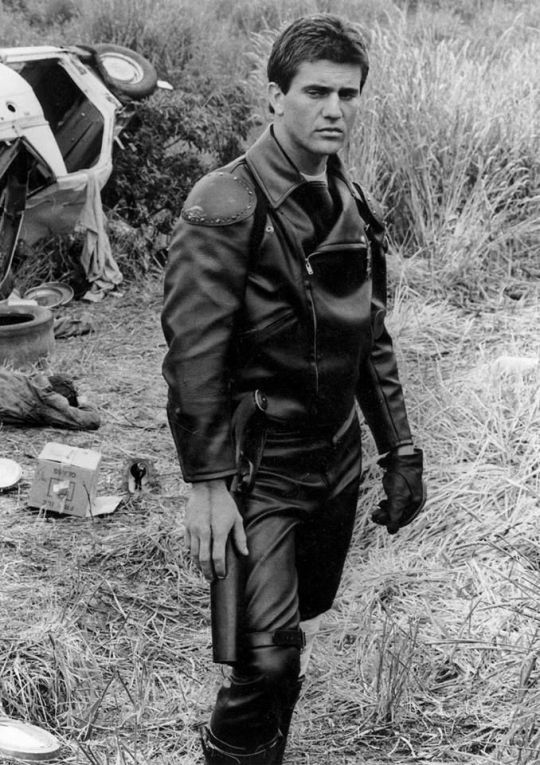
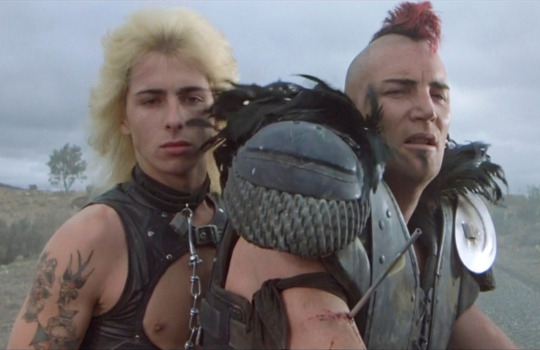
In particular, Ed is styled after Max in the second movie, having lost his family, been badly injured, and watched the world turn into an apocalypse. He's a broken man, withdrawn, violent, and deliberately cutting himself off from others to avoid getting hurt again. The plot of Mad Max 2 is him learning to open up and help others, making himself vulnerable to more loss, but more human in the process.
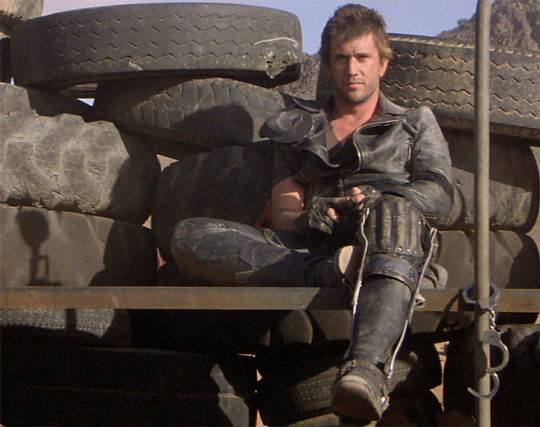
This ties directly into the themes of Our Flag - it's a deliberate intertext. Ed's emotional journey is also one from isolation and pain to vulnerability, community, and love. Mad Max (intentionally and unintentionally) explores themes of masculinity, violence, and power, while Max has become simplified in the popular imagination as a stoic, badass action hero rather than the more complex character he is, struggling with loss and humanity. Similarly, Our Flag explores masculinity, both textually (Stede is trying to build a less abusive pirate culture) and metatextually (the show champions complex, banal, and tender masculinities, especially when we're used to only seeing pirates in either gritty action movies or childish comedies).
Our Flag also draws on the specific countercultures of motorcycles, rockers, and gay/BDSM culture in its design and themes. Naturally, in such a queer show, one can't help but make the connection between leather pirates and leather daddies, and the design certainly nods at this, with its vests and studs. I always think about this guy, with his flat cap so reminiscient of gay leather fashions.
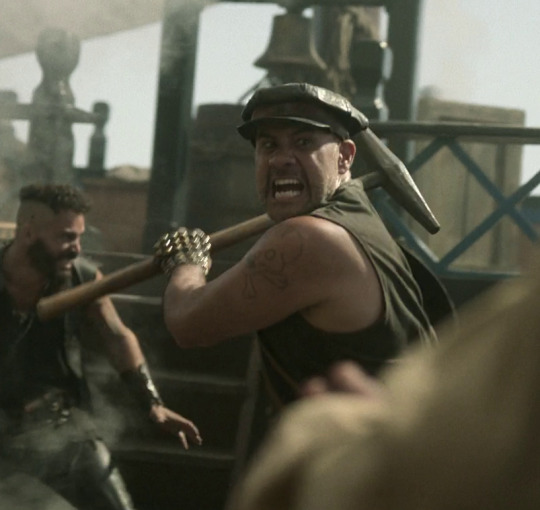
More overtly, though, Blackbeard and his crew are styled as both violent gangsters and countercultural rockstars. They rove the seas like a bikie gang, free and violent, and are seen as icons, bad boys and celebrities. Other pirates revere Blackbeard and wish they could be on his crew, while civilians are awed by his reputation, desperate for juicy, gory details.
This isn't all of why I like the costuming in Our Flag Means Death (especially season 1). Stede's outfits are by no means accurate, but they're a lot more accurate than most pirate media, and they're bright and colourful, with accurate and delightful silks, lace, velvets, and brocades, and lovely, puffy skirts on his jackets. Many of the Revenge crew wear recognisable sailor's trousers, and practical but bright, varied gear that easily conveys personality and flair. There is a surprising dedication to little details, like changing Ed's trousers to fall-fronts for a historical feel, Izzy's puffy sleeves, the handmade fringe on Lucius's red jacket, or the increasing absurdity of navy uniform cuffs between Nigel and Chauncey.
A really big one is the fact that they don't shy away from historical footwear! In almost every example above, we see the period drama's obsession with putting men in skinny jeans and bucket-top boots, but not only does Stede wear his little red-heeled shoes with stockings, but most of his crew, and the ordinary people of Barbados, wear low boots or pumps, and even rough, masculine characters like Pete wear knee breeches and bright colours. It's inaccurate, but at least it's a new kind of inaccuracy, that builds much more on actual historical fashions, and eschews the shortcuts of other, grittier period dramas in favour of colour and personality.
But also. At least it fucking says something with its leather.
#everyone say 'thank you togas' for not including a long tangent about evil rimmer in red dwarf 5x05#Our Flag Means Death#Togas does meta#and yes these principles DO fall apart slightly in s2 and i DON'T like those costumes as much#don't get me wrong they're fun and gorgeous - but generally a bit less deep and more inaccurate. so. :(#I'm not sure this really says anything new about Our Flag but I just needed to get my thoughts out#i hate hate hate Gritty Period Drama costumes they're so boring and so ugly and so wrong#god bless OFMD for using more than 3 muted colours and actually putting men in heels (and not as a shorthand for rich/foppish villainy) <3#looking at that Tudors still is insane like they really will go to any lengths to not make men feel like they've got bare legs XD#image descriptions in alt text#and yes i DID just sink about two hours into those so you'd better appreciate them
1K notes
·
View notes
Text


Knights and knights, and more knights... and sailor waddle dee :)
#my art#kirby#kirby super star#kirby super star ultra#meta knight#meta knights#sailor waddle dee#mace knight#trident knight#javelin knight#axe knight#there are so many#blade knight#sword knight#okay now I'm done#it doesn't feel like a word anymore#meta-knights
2K notes
·
View notes
Text
Just finished Good Omens 2 and I'm honestly boggling at the Aziraphale hate because yes, his decision led to the angsty cliffhanger, but it makes SO much sense for his character. Not just in a "Religious brainwashing and sunk-cost fallacy" kinda way but also a "Aziraphale has no reason to believe this isn't the perfect solution" way. That scene among the nebula is crucial because it establishes that Crowley loved being an angel—reveled in his ability to create and allow his creations to grow kinda like plants—and the only problem was that someone else was calling the shots, someone who wouldn't listen to his criticism. Aziraphale has also spent 6,000+ years watching Crowley do good, all the while forced to deny the fact that he's "nice" lest embracing his original nature get him into trouble with hell. Now, Metatron comes along with an offer that fixes everything in one fell swoop. Crowley can be an angel again, be nice without censure, his ideas and criticisms will hold weight because he'll be answering to Aziraphale, and they'll be together.
It strikes me that Aziraphale isn't there when Crowley sees Gabriel's trial, ergo he likewise doesn't see the (non)acknowledgement that there's an institutional problem up in Heaven. There just happen to have been two archangels who called it quits. Same when Gabriel blurts that phrase out to Crowley. Aziraphale has always been more blind to the ways in which Heaven is "toxic" (for very understandable reasons) and this season he's continually sheltered from new evidence of its structural problems. The plot just preaches to the choir: Crowley. He likewise wouldn't see the conflict Gabriel and Beelzebub have caused as evidence of an underlying problem because that's a problem he and Crowley will no longer share. Why would they be worried about Heaven still being unable to accept partnerships between angels and demons when Crowley will no longer be a demon? And that's something he presumably wants based on Aziraphale's memories of him and the ongoing admission that he's lonely.
The way I see it, they got what they thought they wanted at the start of Season 2. Heaven and Hell are keeping an eye on them, but functionally they're left alone. Crowley can spend all the time he wants with Aziraphale and nothing comes of that except that they're both continually named traitors and the higher-ups grumble about it. If Gabriel had never shown up, things should have been perfect based on Crowley's "Let's just run away and have each other's company" standards. Better, even, considering that they get to be together on their beloved Earth, rather than being bored out in Alpha Centauri without any sushi, plants, books, or Bentleys. And yet... Crowley doesn't strike me as particularly happy. Because, you know, based on that kiss he wants to be with Aziraphale, not just literally be with him, but the point of this post is that his "Let's run away and be an 'us'" falls totally flat when he doesn't explain that specific desire to Aziraphale; the desire to change what an 'us' means. From Aziraphale's perspective they're already an 'us.' That was the entire point of "our side" in Season 1 and now they can continue to be 'us' up in Heaven. Plus, Aziraphale likely sees this as a sacrifice on his part. He will give up his bookshop, his Earthly indulgences, take on the responsibilities of leadership (which I don't think he actually wants for a variety of reasons), and spend the rest of eternity in a place where he's felt so small because he thinks that's what Crowley wants. Crowley was happy as an angel. Crowley wanted them to be together without risk of permanent discorporation. They were able to achieve that after not-Armageddon and he still wasn't happy... so surely those two things together will do the trick. Crowley never actually articulates how he wants their relationship to change and the kiss comes much too late, when he's already rejected what Aziraphale must see as a perfect, selfless solution he's secured for them. Even if Crowley wasn't always moving too fast for him, an overture of romance isn't going to go well after that.
Is this crushing and angsty and devastating as a hiatus? Damn straight, my heart it breaking. But it's a good setup. More importantly, it makes perfect sense for their characters, particularly when they're still talking past one another. Aziraphale is someone who has always moved more slowly as a matter of course, as an angel he has remained immersed in the rhetoric of Heaven, his main avenue of breaking free of that (Crowley) has a huge communication problem (to say nothing of his own denial. He only made headway with the help of Nina and Maggie, seconds before Aziraphale shows up), and Metatron (in a no doubt incredibly manipulative manner) has just offered Aziraphale a job that presumably makes him happy AND Crowley happy AND allows him to maintain the moral this-is-how-the-universe-works perspective he's had since he was literally created. Of course he's going to say yes to all that!! And sure, there are problems in Heaven, Aziraphale isn't completely blind, but he can fix them now that he's in charge. How? Well... he'll figure that out later! Kinda like how he's been making plans on the fly this entire season. That seems logical from his perspective, right? It's not like he's gotten a crash-course in the concept of the master's tools never being able to dismantle the master's house...
#Good Omens#Good Omens spoilers#Good Omens 2#Good Omens 2 spoilers#GO2#GO2 spoilers#mymetas#this is so rough and I'll probably write better metas later#but I just have FEELINGS RIGHT NOW OKAY
3K notes
·
View notes
Text
“Crowley is still an angel deep down” “Crowley is more of an angel than any of the archangels” “Crowley was only cast out because he needed to play his part in Armageddon, he's not a real demon” “Aziraphale wants to rebuild Heaven to be more like Crowley because he’s what an angel should be” no. Stop it. This is exactly where Aziraphale went wrong.
Crowley is 100% a demon. He's not actually a bit of an angel, and he's not cosmically better than any of the other demons we see in the series. He's much less vicious than most of them, yeah, but he's also much less vicious than most of the angels, because how “nice” a celestial being is has nothing to do with which side they're technically on. Crowley's kindness comes from him doing his best to help people despite the hurt he's suffered himself, not any sort of inherent residual or earned holiness. He was cast out just like the rest of the demons, and that's an important part of his history that shouldn't be minimized, excused, or, critically, 'corrected.'
Being angelic is not a positive or negative trait in the Good Omens universe. It's a species descriptor. Saying that Crowley is still an angel deep down because he helps people is an in-character thing for Aziraphale to think, certainly--Job and the final fifteen showed that in the worst possible way--but it's not something Crowley would ever react well to, and it's the main source of conflict in the entire "appoint you to be an angel" fiasco.
We know that Aziraphale thinks Crowley's fall was an injustice, but why? Well, because Crowley is actually Good, which means his fall was a mistake, or a test, or a regrettable error in judgment, or…something. Ineffable. Etc. The point is, he’s special, much better than those other demons, and if they can fix him and make him an angel again, everything will be fine! (So once Job's trials are over, everything will be restored to him? Praise be!) Aziraphale has to believe that Crowley's better traits come from traces of the angel he used to know and not the demon he's known for 6,000 years, because that’s how he can rationalize his incorrect view of Heaven as The Source Of Truth And Light And Good with his complicated feelings about Crowley's fall.
But Crowley's fall was not an injustice because he's actually a Good Person who didn't deserve it. Crowley's fall was an injustice because the entire system of dividing people into Good (obedient) and Bad (rebellious) is bullshit. Crowley is not an unfortunate exception to God's benevolence, he is a particularly sympathetic example of God's cruelty.
And really, Crowley doesn't behave at all like an angel, especially when he's at his best. All of the things that he's done that we as the audience consider Good are things that Heaven has directly opposed. (See: saving the goats and children in defiance of God in S2E2, convincing Aziraphale to give money to Elspeth despite Heaven's views on the "virtues of poverty" in S2E3, speaking out against the flood and the crucifixion in S1E3, tempting Aziraphale to enjoy earthly pleasures because he thinks they'll make him happy, stopping Armageddon.)
Heaven as an institution has never been about helping humanity. And that's not an issue of leadership, as Aziraphale seems to think--it's by design. Aziraphale's first official act as an angel toward humanity was to literally throw them to the lions. Giving them the sword wasn't him acting like an angel, it was just him being himself. Heaven doesn't care about humans. It's not supposed to. It's supposed to win the war against Hell, with humans as chess pieces at best and collateral damage at worst.
Yes, it's easier to think that there are forces that are supposed to be fundamentally good. It's easier to think that Aziraphale is going to show those mean archangels and the Metatron what’s coming to them and reform Heaven into what it "should" be, and that God is actually super chill and watching all of this while shipping ineffable husbands and cheering for them the whole way. And of course it's easier to take Crowley, who Aziraphale (and the audience) adores, and say that he deserves to be on the Good team much more than all those angels and demons that we don’t like. But that's not how it works. People are more complicated than that, even celestial beings.
Crowley is a demon, and the tragedy of his character is not that he's secretly a good guy who is being forced to be evil; the tragedy is that he's lived his whole life stuck between two institutional forces that are both equally hostile to the love he feels for the universe and the beings in it. There are no good and bad guys. There are no "right people." Every angel, demon, and human is capable of hurting or helping others based on their choices. That is, in fact, the entire fucking point.
#good omens meta#good omens#good omens season 2#crowley#long post#i feel like this is obvious. and yet#when crowley is kind he is NOT acting angelic. the same is true of aziraphale.#(to a point. i do think aziraphale performs 'niceness' sometimes because he feels like it's something he Should do as an angel)#(but that's because aziraphale has so many issues i cannot detail them in the tags of this crowley post)#this is my second long meta post in like 3 days. sorry. it’s my first free weekend in a while
2K notes
·
View notes
Text
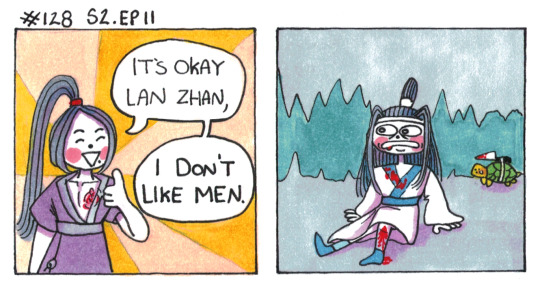
His palms are sweaty, knees weak, arms are heavy.
[First] Prev <–-> Next
#poorly drawn mdzs#mdzs#wei wuxian#lan wangji#tulu xuanwu#blood#Vomit on his sweater already; mom's spaghetti#I love drawing teenji because he gets to be a lot more expressive than Older Lan Wangji.#wwx is trying so hard to be supportive and it keeps backfiring for lwj.#“There's no way I would ever want you carnally ^_^” meanwhile the guy who wants him carnally is losing his mind in agony.#Hot tip if you keep finding yourself in Lan Zhan's shoes: consider being more obvious. Give up on trying to be subtle with an ADHDer.#His game is SO BAD. Abysmally bad rizz. I do not think it was possible for these to to have a chance to get together in this life.#He has no plan. He has no healthy outlet for his feelings. He is looking at his half naked crush and losing his shot.#F in the chat for Lan Zhan. He's just been accidently rejected and he is about to be accused of being straight.#Meta commentary moment: I am going to try very hard to be more consistent with outfits and details across comics#I have had some...difficulties in the past with forgetting details (COUGH the vermillion mark COUGH)#New year new goals! Wish my ADHD eyes and brain good luck!
1K notes
·
View notes
Text
In rewatching the season, I'm noticing how clever Aabria and Brennan were in crafting Tula's story. How well thought out everything was.
Specifically, the bear. It's been mentioned so many times before, but with the context of the completed season, I cannot help but be in awe at the skilful storytelling at display here. The way in which the Blue is described to appear wrong only in reference to Tula and her heart, the way in which Tula talks about curiosity and and having experienced knowing someone who died because of it. Of how Aabria describes to Izzy how Tula looks when she heals the bear, of how Aabria specifically points out that Tula recognises the commonalities between herself and the bear. These breadcrumbs that mean little in the beginning, that tell everything at the end. It's amazing, stunning, masterful storytelling. I am in awe.
#text_loke#meta from loke#Burrow's End#Burrow's End Spoilers#Aabria Iyengar#Brennan Lee Mulligan#i am forever in awe tbh#also the way i gasped at several of brennan and aabria's lines this episode#i'll need to pull some quotes from that whenever i get on my computer#and i desperately need to write a fic about everything that happened from Tula's perspective#but that would be AFTER i finally manage to finish the little beast i'm working on about that Last Fight from Tula's pov#'cos BOY i have a feeling i will write a lot. just 600 words on the intro before 'kill them all'. so y'know. a wordy little thing...#anyway. i love burrow's end so much. i cannot stop thinking about it#Dimension 20 Spoilers#D20 Spoilers
1K notes
·
View notes
Text
Imagine you’re Delgal. Imagine you were raised from birth alongside the court jester. You do everything together. You look up to him, being so much older. He seems wise and responsible, and always encouraging you and caring for you, more than your own busy parents are able to. In every sense of the word, he is your brother, despite how different you look and the distance of your station. The people around you tell you that he is an elf, the tone of their voice implying that’s something scary or even dangerous. But you disagree. That’s Thistle, your big brother.
But… as you age, things become confusing. You get taller, smarter, stronger, and Thistle is there for you through it all. Only… he never seems to change. In your entire journey to adulthood, he hardly seems to have aged a few years, if that. It’s amusing when you first grow taller than him, then grow facial hair, while Thistle’s short stature and youthful face remains the same. Still, you love him, love his music and his wit and even the bold-faced honesty that gets him in trouble if you’re not around to diffuse the situation. You wonder why such a person has been relegated to the inglorious job of jester, and your father tells you very simply that the magic elves wield is too powerful and dangerous to belong to any other position. But you think that’s nonsense, you’ve trusted Thistle from the day you were born and would do so until the day you die.
It isn’t until what should’ve been the happiest day of your life that you truly start to understand just how different Thistle is from you. Kneeling over your father’s cooling corpse, you take in the elf’s panicked face. He’s so young, so unchanged, and in that moment he seems nearly immortal to you. You’ve heard the stories of elf magic, how their spells could be used to heal wounds and raise the dead, but Thistle can’t do any of that. He hasn’t been allowed to. There’s nothing that either of you can do but watch your father slowly die in front of you.
You never want this to happen again, not when there’s something that can stop it. You make Thistle the court sorcerer, even as your advisors warn against it. But you’re the king, goddamn it, and you trust him. But more than that, you want what he can give to you. A power greater than any tallman could achieve. You become busier and busier, only checking up occasionally on his studies. He’s become incredibly proficient in a short amount of time, but your thoughts are elsewhere. Enemies knock on your door, famine chokes the population, and worst of all your beloved son has fallen ill. It’s just like the day of your wedding, but this time, you have something that can defy that fate. Thistle.
But still, it’s not enough. It seems that even elf magic has its limits, and you can’t help but become angry with him. He reacts like a scorned child— is a scorned child, as you’ve come to realize— and you apologize. But he tells you he has something secret to show you, something he’s been searching for, researching for these past few years. The idea unsettles you, but you’ve become desperate, and you can see that he has, too. So you follow him into the dungeon, watch him smash the statue of your kingdom’s guardian and pull the book from the rubble that would decide your and your people’s fate.
Your son is healed, your enemies repelled, and your people fed and taken care of. You’re happy, and so Thistle is, too. You recognize, vaguely, that despite this achievement the familial bonds between the two of you have never been thinner. But you don’t dwell on it. He did what you needed him to do, and now you no longer had to fear the indignity of death or strife.
But of course, things do not remain sweet forever. Thistle has only grown more attached to you, more loyal, and his behavior has become erratic and strange. He keeps you all cooped up in the dungeon, insisting that the outside world is too dangerous. There’s a hardness to his still-youthful features that you never saw throughout all those years growing up alongside him. Slowly but surely the person in your memory is replaced by something frightening, almost repulsive, after he strips your own son’s soul from his body. He seems so unaffected by it all, so… inhuman.
Eventually he decides to give you what you said you wanted all those years ago: to no longer fear death. To become immortal. But it is not what you had hoped for— every day seems to drag into infinity, with joy and mirth seeping rapidly from the unsettled townsfolk as decades, then centuries pass. Thistle has become entirely unapproachable, spending all his time fortifying the dungeon and watching obsessively for any signs of traitors that might challenge the throne. You feel hopeless in it all. No matter how you beg, he never seems to hear you. His power is overwhelming and you fear how he might react to more direct commands. The guilt is intense… you know you pushed him into this, pushed him to find a way to achieve everlasting peace at any cost. But this cost is too much. How could he not see that?
1000 years. 1000 years of this torture, and the population of your kingdom has dwindled to almost nothing. In your dreams you see the vision of a golden lion in chains, its wings pinned as it pleads with you to save it. To save your kingdom, to put the remaining souls to rest. You know what needs to be done, it’s told you the best way. You tell the mad mage that you wish to have dinner together with the whole ‘family’— just like the olden days— and the way his face lights up is almost enough to make you reconsider. Almost.
It was a lie, of course. While he’s distracted you take your son’s empty body, making your way to the surface as fast as your legs can carry you. You know what’s about to happen. You’ll become nothing but dust, but you’ll be free. And with any luck, soon everyone else will be, too. Breaching the surface you get the first rays of sun on your face in a millennium, take your last breaths of fresh air as you tell the story that will free your kingdom.
As you crumble away to nothing, a last thought enters your mind. Perhaps they were all right. Perhaps it was a mistake to trust an elf.
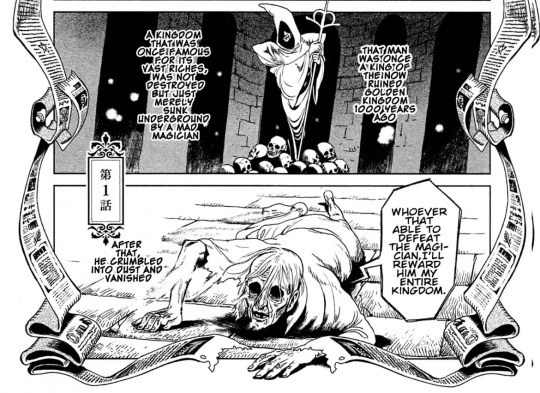
#polly speaks#dungeon meshi#dunmeshi#dungeon meshi spoilers#thistle dungeon meshi#Delgal#dungeon meta#thistle posting#anyway. how we doin#I think Delgal’s so interesting as a character bc I kind of hate him but also have no idea how to feel abt him#so. potential character thought study
827 notes
·
View notes
Text
I love this gay ass show with its literally life ending injuries that heal immediately, but only when convenient to the plot, and its ridiculous use of modern phrases, and its laughing in the face of historical accuracy, and its kissing the face of the fans instead of trying to outwit them, and the way everyone involved in the show seem to go 'I KNOW RIGHT! I'M EXCITED TOO!' instead of mocking the fans
#i have so many feelings#i can't quite express the way everyone involved seems to want us to love the show#like when you love something so you show it to a friend and vibrate with excitement while you watch them love it#so that you can scream about it together#it feels like djenks and the writers and the cast and the crew are in on the joke *with* us#which contrasts so sharply to the way so many fandoms find themselves to *be* the joke#the joke being how much we love the show#the fact that everyone involved cares *so much* about the show is really obvious#not just this is a fun show but this is a *meaningful* show#i truly have never felt so much like i have a community as i have with this show and the fans of it#it is also one of the only shows i can think of (maybe some of neil gaiman's adaptations?) where the trademark over analysing and meta#and theories of the fans isn't ridiculed#this ties back into the being in on the joke thing#back when we didn't know blackbonnet was going to be *canon* canon#and djenks reaction to us freaking out that we were RIGHT was basically#well yeah?#i want to write a love letter to everyone but i don't know how#ofmd#mine#our flag means death#david jenkins#ofmd s2#ofmd 2#kissing david jenkins on the mouth
3K notes
·
View notes
Text
Hypothesis: Aziraphale HATES that Crowley is living in his car.
Supporting evidence:
The very first thing we see him do in the present is stop Maggie from moving out and making sure she feels welcome to stay as long as she likes.
He clearly knows Crowley’s unhappy before anything happens in the plot: “Does it calm you down?”. And also clearly feels helpless about it. Enter the conspicuous Eccles cakes: Aziraphale’s offer, which is rejected.
Crowley’s obviously, for all his hedging, spending a lot of time at the bookshop— so much that he has his own glasses perch and feels immediately comfortable removing them. See also: “Technically my bookshop but we both get plenty of use out of it”, “Why don’t you wait inside? You like waiting inside”.
It’s Crowley who immediately shoves the box of plants into Aziraphale’s arms after Aziraphale returns from Scotland.
Speaking of Scotland, why wouldn’t Aziraphale take the train? Why insist on driving the Bentley? Is it perhaps because he wants to get Crowley and his plants into the shop, and thinks if he creates a situation where Crowley has to stay there, maybe he won’t immediately leave again?
He’s got an empty bedroom and an apparently pathological need to make the person staying there very comfortable, creating cute little customized souvenirs like he’s an Air B&B host (displacement!).
He immediately jumps to having Gabriel stay with him— he didn’t have to. Arguably, both Gabriel and Aziraphale would be safer if Gabe stayed elsewhere.
That’s what I’ve got for now but I’m sure there’s more. Throughout the show, watch what Aziraphale gives to others and does for others, and it’ll tell you what he wants to do for Crowley. He’s living so deeply in displacement in makes him come across as manic and brittle.
(What probably happened is Aziraphale offered the spare bedroom and Crowley, who unconsciously didn’t want to be his roommate or sleep in a single bed with Aziraphale right downstairs because how could the poor lovesick boy cope with that, told him he wasn’t a “good deed” for Aziraphale to do and stormed off.)
Conclusion: Aziraphale asked Crowley to stay at his place, immediately and probably repeatedly. They had a row about it, and Crowley refused, and to this day Aziraphale doesn’t understand why.
And it hurts him.
#this might be the start of a longer meta about Aziraphale feeling rejected by Crowley repeatedly throughout this season#being made to feel like he’s doing the wrong thing or not good enough#they’re fracturing apart before the season even starts#all because they both fear rejection so much that Crowley preemptively rejects Aziraphale and Aziraphale is afraid to push#look at the projection and displacement and you’ll see what’s really going on#ineffable husbands#good omens#good omens meta#the awkward homeless Crowley situation#it’s absolutely manufactured and unnecessary#Crowley’s literally circling Aziraphale#and Aziraphale just wants him to come inside#good omens season two#good omens season 2#renew good omens#just so they can finally have a talk about how Crowley is such a drama queen he lived in his car for three years
3K notes
·
View notes
Text
i'm surprised i haven't seen any text posts yet about the Unsubtle Differences between astarion’s tiefling party/high approval forest scene and the one you get after the goblin party.
there’s something so terribly interesting about how the conversation afterward plays out depending on which variation you pursue.
like, most people have seen the tiefling party version by now. astarion basking in the sunlight the morning after, playing off most of what tav says with relative ease, even when they ask about his scars and he tells them about cazador. his cadence is smooth and composed, his smile almost friendly, even though you know, as the viewer, he’s playing a game of manipulation at this point. the only real crack in his demeanor is if tav notices that cazador’s “poem” was written in infernal, which, understandably, startles him.
but recently i watched the goblin party version of this same scene, and everything reads so differently. unlike at the tiefling party, it’s still the middle of the night when astarion tries to leave, thinking tav is asleep—almost immediately after the act, in fact. when tav does speak to him, he’s visibly nervous, halting and stammering in the middle of lines delivered unflinchingly in the other version of the scene. he gestures broadly and fidgets more while talking, his smile comes and goes. there’s even some of his distinctive high pitched, fake laughter sprinkled throughout the exchange, almost identical to later scenes where he's very, very obviously uncomfortable (like if raphael mocks him and magics off astarion's shirt to show the party his scars in act 2, or when confronting the gur children in their cell in act 3, etc etc).
siding with the goblins represents something deeply familiar to astarion, a level of cruelty he's more than familiar with and embraces likely because cruelty and duplicity, to him, go hand-in-hand with the power and freedom he craves so badly—but he won't stay the night with this tav, even if he approves of their actions. no, in this case, he'll keep to what's familiar and attempt to leave them in the forest under the cover of the very same darkness he resents having been cast into by cazador. when he gets caught, it sets him on edge, and everything he says becomes such a blatant lie to save face that tav would have to be completely oblivious not to see through him, or maybe just not care enough to.
but if tav saves the refugees? challenges his worldview and comes out victorious? oh, he'll complain of the poor rewards for his trouble at the party and whine about it being boring, but he decides to stay with tav through the night while they're asleep and on past dawn. he takes a moment to enjoy the morning sunlight, returned to his life after two centuries without. the same is true if you have high enough approval that he asks before the party, in which case, you've almost certainly hit his biggest approval gains: trusting him and supporting his safety. maybe he doesn't trip over his words when he speaks because, well, maybe this is someone he doesn't have to worry about. someone who's already more than proven themselves a foolish, heroic sort with a bleeding heart or otherwise demonstrated that they're already in his corner. in other words, not a threat—at least not to him.
does any of this make sense. i wanna study this guy under a microscope.
#the text may be the same but the line delivery is so enormously different it HAS to mean something idk! idk!#what he knows best but doesn't quite trust vs what's new but seems almost safe seems like the differentiating factor honestly#at least in whether he decides to leave tav immediately or stay with them till morning#which in turn affects how he feels by the time tav speaks to him#not to rag on the goblin route but man#he seems. well. frantic when he gets caught trying to leave asap.#to the point where listening to him feels... pretty bad imo#i'd love to know if it changes his romance later on because that seems like. well. a rough start#astarion#astarion bg3#astarion ancunin#bg3 spoilers#baldur's gate 3#bg3 meta#sort of idk#long post
2K notes
·
View notes